新概念第二册lesson20 One man in a boat课件(共23张PPT)
文档属性
| 名称 | 新概念第二册lesson20 One man in a boat课件(共23张PPT) | 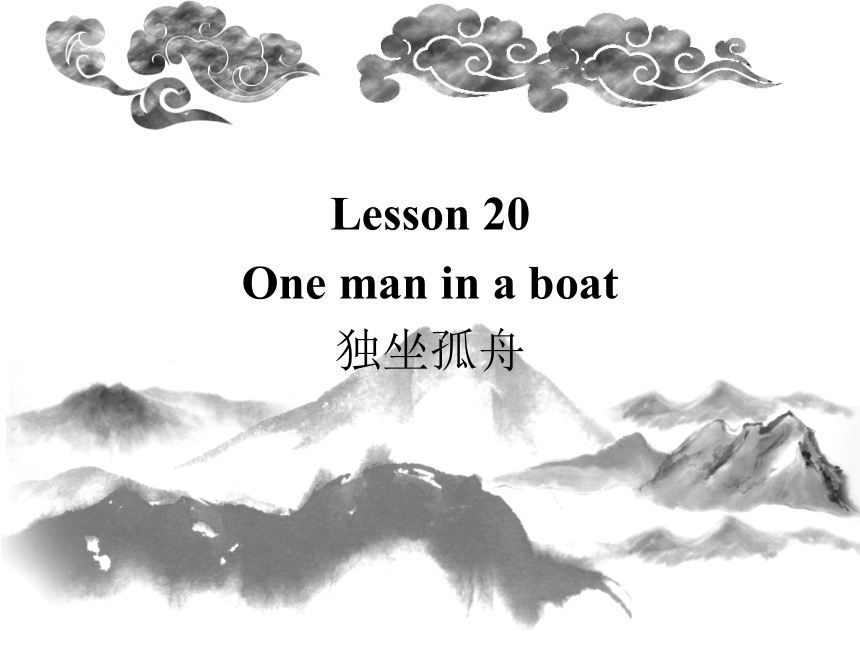 | |
| 格式 | pptx | ||
| 文件大小 | 814.9KB | ||
| 资源类型 | 教案 | ||
| 版本资源 | 新概念英语 | ||
| 科目 | 英语 | ||
| 更新时间 | 2025-01-02 08:29:04 | ||
图片预览

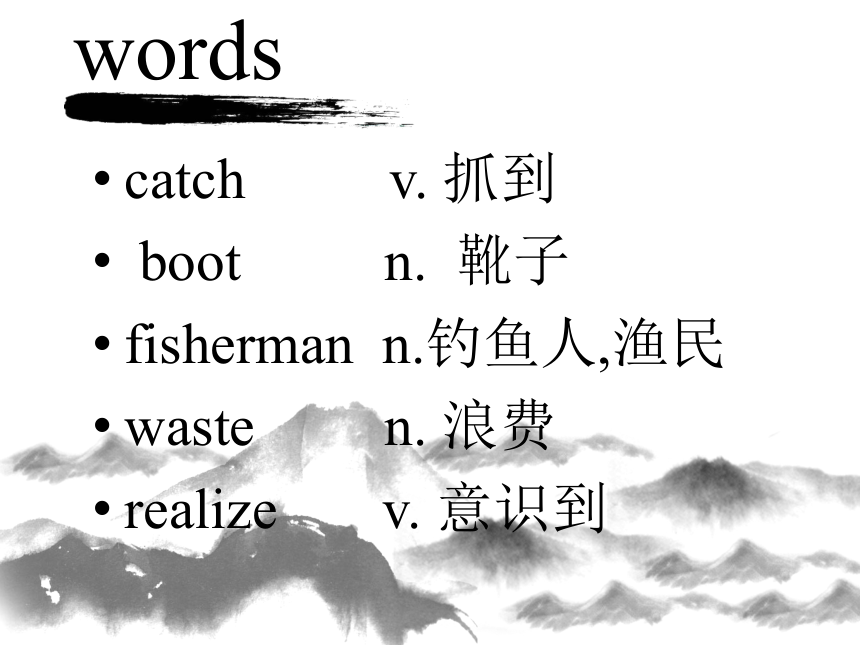
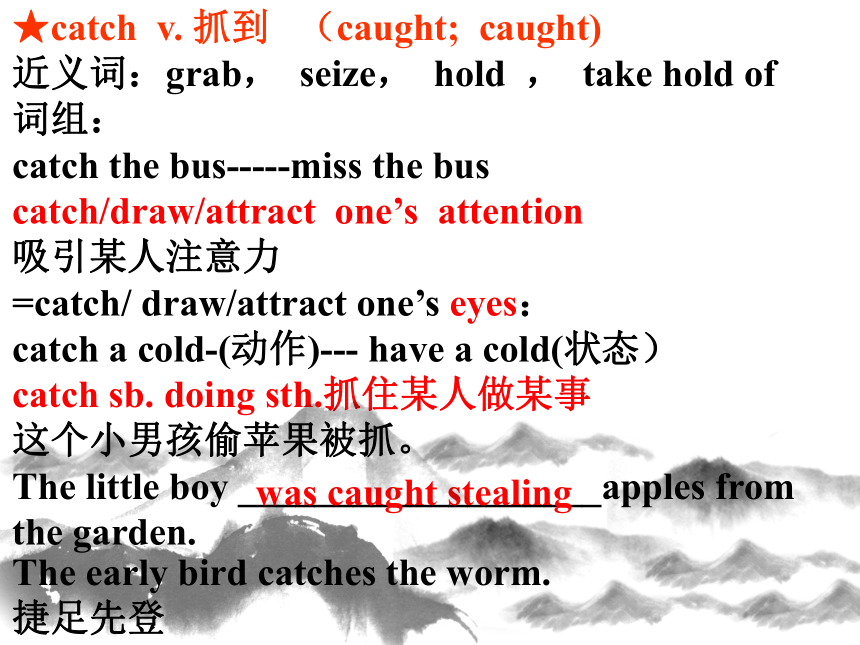
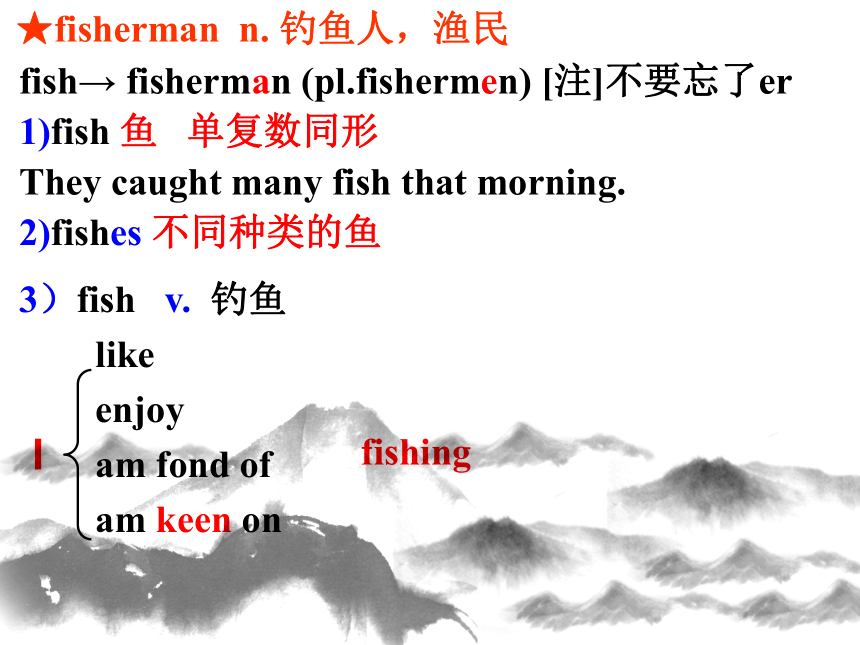
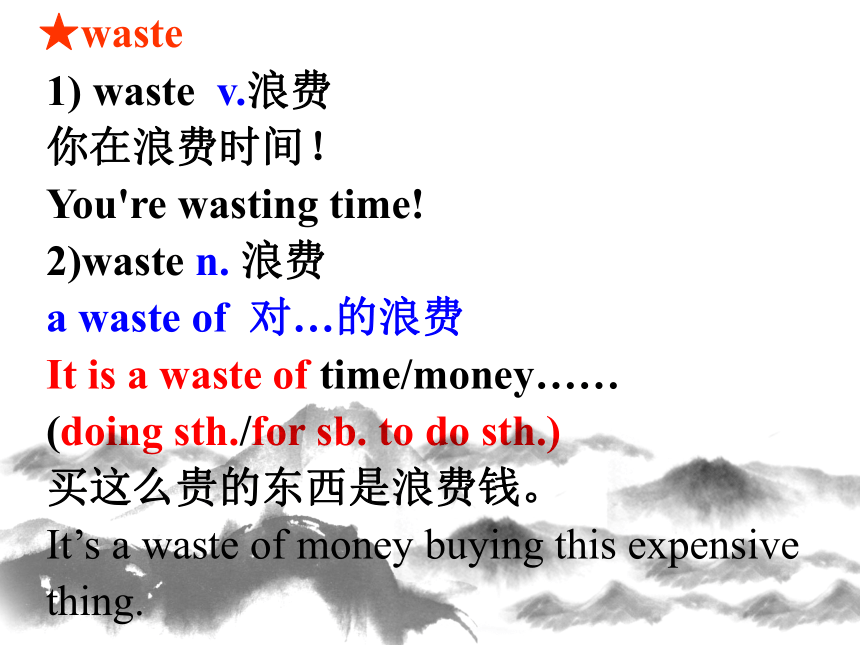

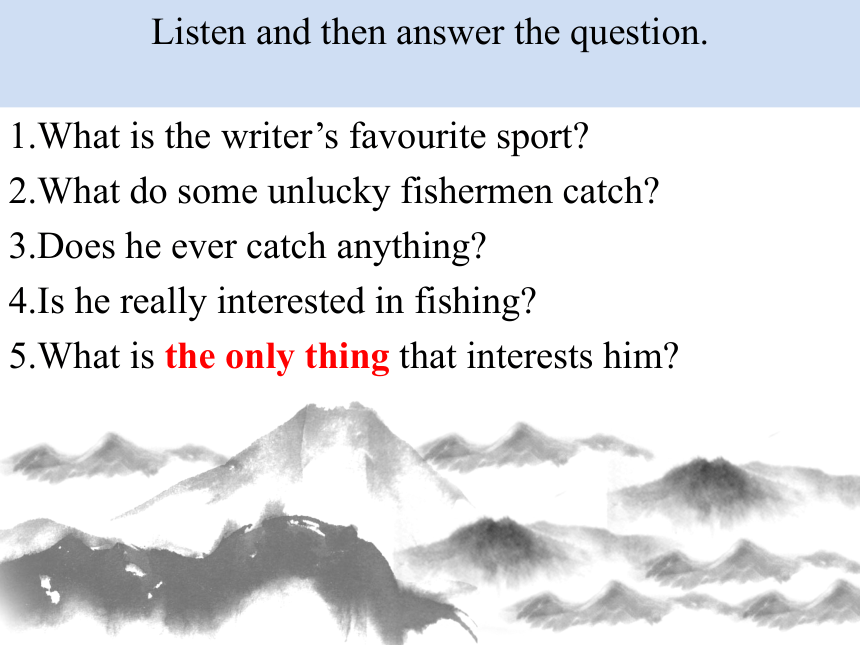
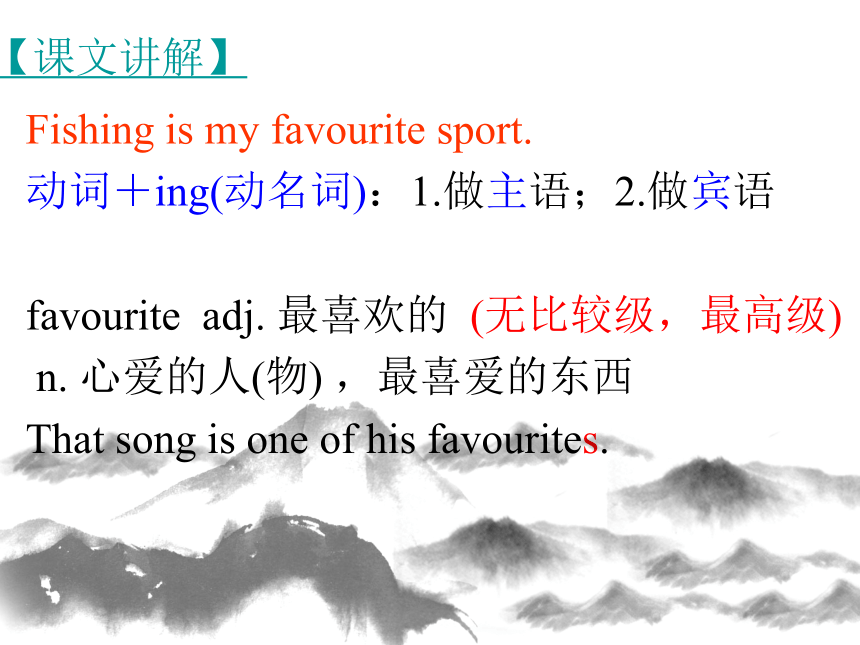
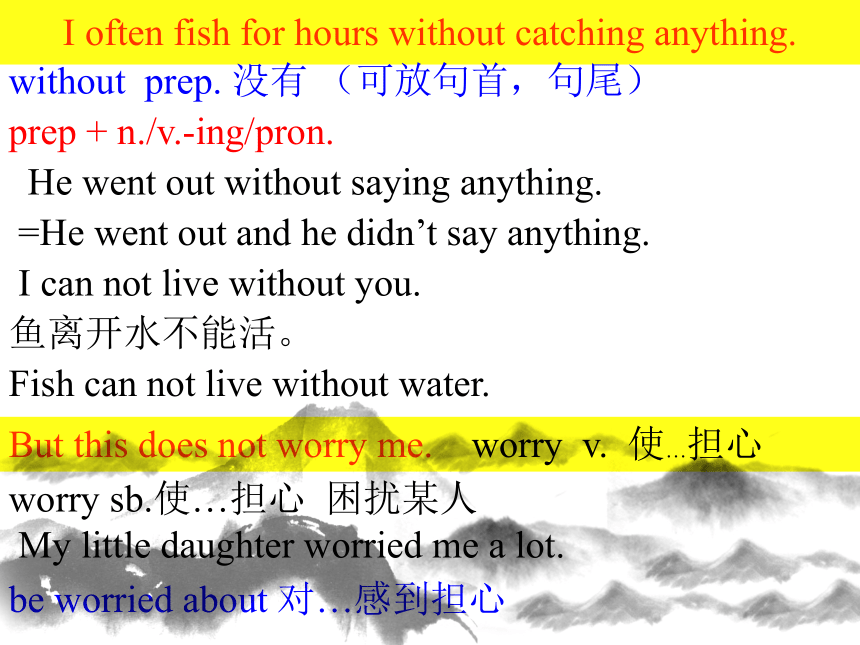
文档简介
(共23张PPT)
Lesson 20
One man in a boat
独坐孤舟
words
catch v. 抓到
boot n. 靴子
fisherman n.钓鱼人,渔民
waste n. 浪费
realize v. 意识到
★catch v. 抓到 (caught; caught)
近义词:grab, seize, hold , take hold of
词组:
catch the bus-----miss the bus
catch/draw/attract one’s attention
吸引某人注意力
=catch/ draw/attract one’s eyes:
catch a cold-(动作)--- have a cold(状态)
catch sb. doing sth.抓住某人做某事
这个小男孩偷苹果被抓。
The little boy ___________________apples from the garden.
was caught stealing
The early bird catches the worm.
捷足先登
★fisherman n. 钓鱼人,渔民
fish→ fisherman (pl.fishermen) [注]不要忘了er
1)fish 鱼 单复数同形
They caught many fish that morning.
2)fishes 不同种类的鱼
3)fish v. 钓鱼
like
enjoy
am fond of
am keen on
fishing
I
★waste
1) waste v.浪费
你在浪费时间!
You're wasting time!
2)waste n. 浪费
a waste of 对…的浪费
It is a waste of time/money……
(doing sth./for sb. to do sth.)
买这么贵的东西是浪费钱。
It’s a waste of money buying this expensive
thing.
★realize
real adj.真的 → realize v.意识到→reality n.现实
1)v.认识到,意识到 (不用于被动语态,不用于进行时态,人做主语。)
realize(=be aware of) one's mistake
He realized that the beautiful girl was lying.
2) vt.实现(计划等)
(可用于主动,也可用于被动)
realize one's hope/dream/plan
他终于实现了他的梦想。
He realized his dream at last.
→His dream was realized at last.
come true 成为现实 (物作主语,无被动语态)
Listen and then answer the question.
1.What is the writer’s favourite sport
2.What do some unlucky fishermen catch
3.Does he ever catch anything
4.Is he really interested in fishing
5.What is the only thing that interests him
【课文讲解】
Fishing is my favourite sport.
动词+ing(动名词):1.做主语;2.做宾语
favourite adj. 最喜欢的 (无比较级,最高级)
n. 心爱的人(物) ,最喜爱的东西
That song is one of his favourites.
I often fish for hours without catching anything.
without prep. 没有 (可放句首,句尾)
prep + n./v.-ing/pron.
He went out without saying anything.
=He went out and he didn’t say anything.
I can not live without you.
鱼离开水不能活。
Fish can not live without water.
But this does not worry me. worry v. 使…担心
worry sb.使…担心 困扰某人
My little daughter worried me a lot.
be worried about 对…感到担心
Instead of catching fish, they catch old boots and rubbish.
instead of 不做…而做… (可置于句首或句尾)
instead of 后面的词一定是没有做的,可以放在主句后面
我去了学校而不是待在家里。
I went to school instead of staying at home.
是他参军而不是他的哥哥。
He joins the army instead of his brother.
instead of +n./ pron./v.-ing
I am even less lucky.
even 甚至
more/less lucky
less+原级 (消极比较级) :
A is less ... than B A比B更不...
I am less happy than before.
This story is less interesting than that one.
not so/as ...as 不及,不如
I am not so happy as before.
This story is not so interesting as that one.
After having spent whole mornings on the river, I always go home with an empty bag.
主语?
After I have spent whole mornings on the river, I always go home with an empty bag.
after(conj.连词)+从句,从句主语必须是主句的主语才能换成下面一种形式
after(prep.)+名词/动词的ing形式
After I go to school,I learned a lot of knowledge.
After going to school,I learned a lot of knowledge.
After the students handed in their papers, the teacher left. (本句主从句主语不一致,不可省略成 after doing 形式)
'You must give up fishing!' my friends say. 'It's a waste of time.'
give up
give up fishing/smoking/fighting
I'm not really interested in fishing. I am only interested in sitting in a boat and doing nothing at all!
be interested in sth./ doing sth.
Everyone is interested in beauties
interesting 令人感兴趣的(一般物做主语)
Fishing is not interesting.
excited/exciting
surprised/surprising
disappointed/disappointing
ing形式 形容物
ed形式 形容人
sit in a boat 坐在船上
be in the same boat 同舟共济
关键句型—动名词
1)动名词是动词的一种非谓语形式;
2)v.+ing形式;
3) 它在句中充当名词的作用,可单独或引起短语作主语,表语,动词宾语,或介词的宾语以及定语。)
V-ing 形式作主语 往往表示抽象、笼
统的动作或泛指某动作或行为。如:
a.) Getting up early is a good habit.
b.) Fishing is Tom’s favorite hobby.
c.)Arguing with him is a waste of time.
Subject
2) V-ing形式作表语 (放在系动词之后,泛指某种动作或行为,常用来说明主语的身份、内容或特点。)如:
a.) My job is testing all kinds of software.
b.) The purpose of my letter is advising you to do more sports.
c.) His greatest happiness is serving the people.
d.) Seeing is believing.
Predictive
系动词又称连系动词,不单独作谓语,必须与表语连用构成系表结构。
基本上有三个方面内容:
一个就是be和其变形,如:am,is,are,was,were,been,being;
第二类可以称为感官性系动词,如feel,taste,look,seem,sound;
第三类可以称为变化性系动词,如:become,grow,get,turn。
2) V-ing形式作宾语
a.) She sat there without speaking.
b.) David is interested in driving.
c.) Do you mind turning on the TV
d.)Betty enjoys listening to pop music.
Object
★ 能用动名词作宾语的动词有两类:
一类是只能用动名词作宾语的动词,其中有:avoid, admit, consider, advise, dislike, enjoy, escape, excuse, mind等,(+Ving的动词)如:
Mary is considering changing her job.
I enjoy working with you.
Would you mind ringing me up tomorrow
另一类是既可以用动名词,又可以用不定式作宾语的动词,其中有:continue, forget, hate, intend, like, love, plan, prefer, propose, regret, remember, start, try, want, need, can’t afford等。
练习题:
用括号内动词的适当形式填空:
_______ (listen) to pop music is something he enjoys.
The workers left after ________ (finish) the work.
After __________________ (spend) the money, he wrote to his father.
You should apologize to your teacher for ______ (come) late.
We can learn how to write by ______ (read).
Don’t be afraid of ______ (ask) questions.
Are you interested in ______ (play) volleyball
He left home without ______(lock) the door.
Listening
finishing
having spent/spending
coming
reading
asking
playing
locking
9._________ (teach) English is my job.
10.Why does he enjoy________ (walk) in rain
11.He apologized for _________ (not hand) in the homework on time.
12.Instead of ________ (go) to see a doctor, he lay in bed and had a sleep.
13.I stayed in bed all day instead of ________ (go) to work.
14.A lot of men have given up _________(wear) hats.
15.She is very interested in ________ (dance).
16.On _______ (enter) the room, he turned on the light.
Teaching
walking
not handing
going
going
wearing
dancing
entering
Tell the story:
1. Fishing—favourite aport
2. often—hours—anything
3. some—unlucky
4. Instead—fish—boots—rubbish
5. I—less
6. never—even—boots
7. whole mornings—river—home—empty
8. ‘give up’ —friends—‘waste—’
9. don’t realize—important thing
10. only—sitting—nothing
Lesson 20
One man in a boat
独坐孤舟
words
catch v. 抓到
boot n. 靴子
fisherman n.钓鱼人,渔民
waste n. 浪费
realize v. 意识到
★catch v. 抓到 (caught; caught)
近义词:grab, seize, hold , take hold of
词组:
catch the bus-----miss the bus
catch/draw/attract one’s attention
吸引某人注意力
=catch/ draw/attract one’s eyes:
catch a cold-(动作)--- have a cold(状态)
catch sb. doing sth.抓住某人做某事
这个小男孩偷苹果被抓。
The little boy ___________________apples from the garden.
was caught stealing
The early bird catches the worm.
捷足先登
★fisherman n. 钓鱼人,渔民
fish→ fisherman (pl.fishermen) [注]不要忘了er
1)fish 鱼 单复数同形
They caught many fish that morning.
2)fishes 不同种类的鱼
3)fish v. 钓鱼
like
enjoy
am fond of
am keen on
fishing
I
★waste
1) waste v.浪费
你在浪费时间!
You're wasting time!
2)waste n. 浪费
a waste of 对…的浪费
It is a waste of time/money……
(doing sth./for sb. to do sth.)
买这么贵的东西是浪费钱。
It’s a waste of money buying this expensive
thing.
★realize
real adj.真的 → realize v.意识到→reality n.现实
1)v.认识到,意识到 (不用于被动语态,不用于进行时态,人做主语。)
realize(=be aware of) one's mistake
He realized that the beautiful girl was lying.
2) vt.实现(计划等)
(可用于主动,也可用于被动)
realize one's hope/dream/plan
他终于实现了他的梦想。
He realized his dream at last.
→His dream was realized at last.
come true 成为现实 (物作主语,无被动语态)
Listen and then answer the question.
1.What is the writer’s favourite sport
2.What do some unlucky fishermen catch
3.Does he ever catch anything
4.Is he really interested in fishing
5.What is the only thing that interests him
【课文讲解】
Fishing is my favourite sport.
动词+ing(动名词):1.做主语;2.做宾语
favourite adj. 最喜欢的 (无比较级,最高级)
n. 心爱的人(物) ,最喜爱的东西
That song is one of his favourites.
I often fish for hours without catching anything.
without prep. 没有 (可放句首,句尾)
prep + n./v.-ing/pron.
He went out without saying anything.
=He went out and he didn’t say anything.
I can not live without you.
鱼离开水不能活。
Fish can not live without water.
But this does not worry me. worry v. 使…担心
worry sb.使…担心 困扰某人
My little daughter worried me a lot.
be worried about 对…感到担心
Instead of catching fish, they catch old boots and rubbish.
instead of 不做…而做… (可置于句首或句尾)
instead of 后面的词一定是没有做的,可以放在主句后面
我去了学校而不是待在家里。
I went to school instead of staying at home.
是他参军而不是他的哥哥。
He joins the army instead of his brother.
instead of +n./ pron./v.-ing
I am even less lucky.
even 甚至
more/less lucky
less+原级 (消极比较级) :
A is less ... than B A比B更不...
I am less happy than before.
This story is less interesting than that one.
not so/as ...as 不及,不如
I am not so happy as before.
This story is not so interesting as that one.
After having spent whole mornings on the river, I always go home with an empty bag.
主语?
After I have spent whole mornings on the river, I always go home with an empty bag.
after(conj.连词)+从句,从句主语必须是主句的主语才能换成下面一种形式
after(prep.)+名词/动词的ing形式
After I go to school,I learned a lot of knowledge.
After going to school,I learned a lot of knowledge.
After the students handed in their papers, the teacher left. (本句主从句主语不一致,不可省略成 after doing 形式)
'You must give up fishing!' my friends say. 'It's a waste of time.'
give up
give up fishing/smoking/fighting
I'm not really interested in fishing. I am only interested in sitting in a boat and doing nothing at all!
be interested in sth./ doing sth.
Everyone is interested in beauties
interesting 令人感兴趣的(一般物做主语)
Fishing is not interesting.
excited/exciting
surprised/surprising
disappointed/disappointing
ing形式 形容物
ed形式 形容人
sit in a boat 坐在船上
be in the same boat 同舟共济
关键句型—动名词
1)动名词是动词的一种非谓语形式;
2)v.+ing形式;
3) 它在句中充当名词的作用,可单独或引起短语作主语,表语,动词宾语,或介词的宾语以及定语。)
V-ing 形式作主语 往往表示抽象、笼
统的动作或泛指某动作或行为。如:
a.) Getting up early is a good habit.
b.) Fishing is Tom’s favorite hobby.
c.)Arguing with him is a waste of time.
Subject
2) V-ing形式作表语 (放在系动词之后,泛指某种动作或行为,常用来说明主语的身份、内容或特点。)如:
a.) My job is testing all kinds of software.
b.) The purpose of my letter is advising you to do more sports.
c.) His greatest happiness is serving the people.
d.) Seeing is believing.
Predictive
系动词又称连系动词,不单独作谓语,必须与表语连用构成系表结构。
基本上有三个方面内容:
一个就是be和其变形,如:am,is,are,was,were,been,being;
第二类可以称为感官性系动词,如feel,taste,look,seem,sound;
第三类可以称为变化性系动词,如:become,grow,get,turn。
2) V-ing形式作宾语
a.) She sat there without speaking.
b.) David is interested in driving.
c.) Do you mind turning on the TV
d.)Betty enjoys listening to pop music.
Object
★ 能用动名词作宾语的动词有两类:
一类是只能用动名词作宾语的动词,其中有:avoid, admit, consider, advise, dislike, enjoy, escape, excuse, mind等,(+Ving的动词)如:
Mary is considering changing her job.
I enjoy working with you.
Would you mind ringing me up tomorrow
另一类是既可以用动名词,又可以用不定式作宾语的动词,其中有:continue, forget, hate, intend, like, love, plan, prefer, propose, regret, remember, start, try, want, need, can’t afford等。
练习题:
用括号内动词的适当形式填空:
_______ (listen) to pop music is something he enjoys.
The workers left after ________ (finish) the work.
After __________________ (spend) the money, he wrote to his father.
You should apologize to your teacher for ______ (come) late.
We can learn how to write by ______ (read).
Don’t be afraid of ______ (ask) questions.
Are you interested in ______ (play) volleyball
He left home without ______(lock) the door.
Listening
finishing
having spent/spending
coming
reading
asking
playing
locking
9._________ (teach) English is my job.
10.Why does he enjoy________ (walk) in rain
11.He apologized for _________ (not hand) in the homework on time.
12.Instead of ________ (go) to see a doctor, he lay in bed and had a sleep.
13.I stayed in bed all day instead of ________ (go) to work.
14.A lot of men have given up _________(wear) hats.
15.She is very interested in ________ (dance).
16.On _______ (enter) the room, he turned on the light.
Teaching
walking
not handing
going
going
wearing
dancing
entering
Tell the story:
1. Fishing—favourite aport
2. often—hours—anything
3. some—unlucky
4. Instead—fish—boots—rubbish
5. I—less
6. never—even—boots
7. whole mornings—river—home—empty
8. ‘give up’ —friends—‘waste—’
9. don’t realize—important thing
10. only—sitting—nothing
同课章节目录
